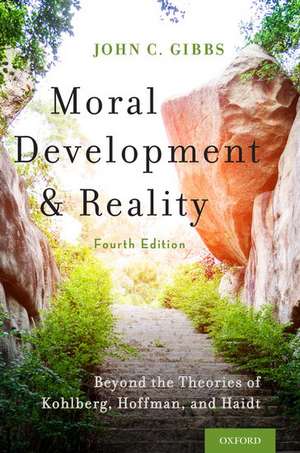Moral Development and Reality: Beyond the Theories of Kohlberg, Hoffman, and Haidt
Autor John C. Gibbsen Limba Engleză Paperback – 30 mai 2019
| Toate formatele și edițiile | Preț | Express |
|---|---|---|
| Paperback (2) | 378.60 lei 31-37 zile | |
| Oxford University Press – 30 mai 2019 | 378.60 lei 31-37 zile | |
| SAGE Publications – 17 iun 2003 | 555.94 lei 6-8 săpt. |
Preț: 378.60 lei
Preț vechi: 469.29 lei
-19% Nou
Puncte Express: 568
Preț estimativ în valută:
72.45€ • 75.83$ • 60.30£
72.45€ • 75.83$ • 60.30£
Carte tipărită la comandă
Livrare economică 20-26 martie
Preluare comenzi: 021 569.72.76
Specificații
ISBN-13: 9780190878214
ISBN-10: 0190878215
Pagini: 424
Dimensiuni: 155 x 231 x 25 mm
Greutate: 0.59 kg
Ediția:4
Editura: Oxford University Press
Colecția OUP USA
Locul publicării:New York, United States
ISBN-10: 0190878215
Pagini: 424
Dimensiuni: 155 x 231 x 25 mm
Greutate: 0.59 kg
Ediția:4
Editura: Oxford University Press
Colecția OUP USA
Locul publicării:New York, United States
Recenzii
Moral Development and Reality is a truly impressive work. It offers not only a theoretical but also an empirical basis for the right and the good, and a rationale for a new ethic of connection and loving reciprocity.
I enthusiastically recommend John Gibbs' Moral Development & Reality to scholars, practitioners, parents, and students. . . . Like Gibbs himself, this book is sincerely honest, very smart, and truly helpful.
I enthusiastically recommend John Gibbs' Moral Development & Reality to scholars, practitioners, parents, and students. . . . Like Gibbs himself, this book is sincerely honest, very smart, and truly helpful.
Notă biografică
John C. Gibbs is Professor of Developmental Psychology at The Ohio State University, Columbus. His research interests include cross-cultural sociomoral development, parental socialization, empathy, prosocial behavior, and antisocial behavior. Dr. Gibbs developed a major intervention program for antisocial youth and has established assessment measures of moral judgment, moral identity, social perspective taking, self-serving cognitive distortions, and social skills. In addition to his books, Dr. Gibbs has authored or coauthored over 90 book chapters and articles on topics pertaining to moral development and reality.
Cuprins
Foreword - Daniel K. Lapsley
Preface
1. Introduction
Social Perspective-Taking and the Moral Point of View
The Right and the Good: The Moral Domain
Introducing Chapters Two Through Nine
2. "The Right" and Moral Development: Fundamental Themes of Kohlberg's Cognitive Developmental Approach
Early-Childhood Superficiality
Beyond Centrations and Superficial Judgment
Stages of Moral Reciprocity
Assessing Stages of Immature and Mature Moral Judgment
Concluding Comment
3. Kohlberg's Theory: A Critique and New View
Background
Kohlberg's Overhaul of Piaget's Phases
Adult Moral Development in Kohlberg's Theory
A New View of Lifespan Moral Judgment Development
Conclusion
4. "The Good" and Moral Development: Hoffman's Theory
The Empathic Predisposition
Modes of Empathic Arousal
Empathy and Cognitive Development: Stages of Empathic Distress
The Empathic Predisposition, Cognition, and Affective Primacy
The Empathic Predisposition, Socialization, and Moral Internalization
Conclusion and Critique
5. Moral Development, Moral Sef-Relevance, and Prosocial Behavior
Prosocial Behavior: A Rescue
Individual Differences in Prosocial Behavior
Conclusion: Two Spurious "Moral Exemplars"
6. Understanding Antisocial Behavior
Limitations of Antisocial Youth
A Case Study
7. Treating Antisocial Behavior
The Mutual Help Approach
The Psychoeducational or Skills Training Approach
Evaluation of the Equip Program
Perspective-Taking for Severe Offenders
8. Beyond the Theories: A Deeper Reality?
Two Case Studies
A Deeper Reality?
Moral Insight and Inspiration
Conclusion
9. Conclusion
The Issue of Moral Motivation
Moral Perception and Reality
References
Index
Appendix
About the Author
Preface
1. Introduction
Social Perspective-Taking and the Moral Point of View
The Right and the Good: The Moral Domain
Introducing Chapters Two Through Nine
2. "The Right" and Moral Development: Fundamental Themes of Kohlberg's Cognitive Developmental Approach
Early-Childhood Superficiality
Beyond Centrations and Superficial Judgment
Stages of Moral Reciprocity
Assessing Stages of Immature and Mature Moral Judgment
Concluding Comment
3. Kohlberg's Theory: A Critique and New View
Background
Kohlberg's Overhaul of Piaget's Phases
Adult Moral Development in Kohlberg's Theory
A New View of Lifespan Moral Judgment Development
Conclusion
4. "The Good" and Moral Development: Hoffman's Theory
The Empathic Predisposition
Modes of Empathic Arousal
Empathy and Cognitive Development: Stages of Empathic Distress
The Empathic Predisposition, Cognition, and Affective Primacy
The Empathic Predisposition, Socialization, and Moral Internalization
Conclusion and Critique
5. Moral Development, Moral Sef-Relevance, and Prosocial Behavior
Prosocial Behavior: A Rescue
Individual Differences in Prosocial Behavior
Conclusion: Two Spurious "Moral Exemplars"
6. Understanding Antisocial Behavior
Limitations of Antisocial Youth
A Case Study
7. Treating Antisocial Behavior
The Mutual Help Approach
The Psychoeducational or Skills Training Approach
Evaluation of the Equip Program
Perspective-Taking for Severe Offenders
8. Beyond the Theories: A Deeper Reality?
Two Case Studies
A Deeper Reality?
Moral Insight and Inspiration
Conclusion
9. Conclusion
The Issue of Moral Motivation
Moral Perception and Reality
References
Index
Appendix
About the Author
